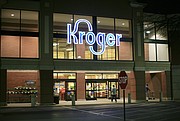10/19/2022

Think the cost of food is high? Just wait.
Last week, Kroger announced plans to acquire Albertsons in a staggering $24.6 billion deal. If the deal goes through, it will merge the number one and number two stand-alone grocery chains which together operate nearly 5,000 stores around the country and generate more than $200 billion in revenue each year.
If you think this doesn't affect you, think again. Kroger and Albertsons are holding companies as well as brands. Kroger brands include Ralphs, Dillons, Fred Meyer, Harris Teeter, King Soopers and several more. Albertsons operates under the names of Safeway, Haggen, Jewel-Osco, Shaws, Pavilions, Vons and several others.
Well versed by their financial advisers, the companies' CEOs are saying all the right things. The merger, they maintain, will allow major savings and efficiencies, some of which they will reinvest, much of which they will return to consumers in lower prices. And if you believe that, there is a bridge in the Utah desert that they'd like to sell you.
In reality, the merger will further consolidate the grocery store market. Right now, before the merger, according to the National Grocers Association, five companies control a stunning 60 percent of all U.S. grocery sales. After the merger, the combined company plus Walmart, by far the largest food seller, would control nearly 50 percent of the market.
That kind of concentration will lead to the loss of jobs for workers, rising prices for consumers and monopoly profits for the companies. Working families are already stretching to meet their food needs, as food prices are rising rapidly. Eggs are up over 30 percent for the year; chicken over 17 percent, and coffee over 15 percent. As the American Economic Liberties Project summarized, this merger "would be disastrous for market competition, small businesses, and especially consumers' pockets."
There are a lot of factors hitting food prices these days - the Ukraine war, drought in large portions of the U.S. and in China, an avian flu epidemic, and more. But, as David Dayan of the American Prospect reports, one contributing factor is that consolidated companies take advantage of the moment to raise their own prices and profits even more. Dayan quotes Kroger CEO Rodney McMullen, who will head the merged company, saying that "a little bit of inflation is always good in our business" because "customers don't overly react" - that is, blame the companies - to increases in prices.
Happily, Joe Biden has chosen anti-monopoly advocates to lead the agencies that police mergers, like the Federal Trade Commission that oversees grocery chains. The FTC head Lisa Kahn will surely challenge this merger. What the companies are counting on is that conservative judges will overturn the agencies and give the merger a pass. No question with billions at stake, they will have the best lawyers in the world to wage the legal war.
This is part of a bigger story. Today, American wages aren't keeping up with rising prices, while corporations - particularly in industries dominated by a small number of companies - pocket record profits.
Reacting to inflation, the Federal Reserve is doing what it always does to lower prices - hike interest rates to slow the economy, throw millions out of work, and force wages down.
But workers' wages aren't driving inflation. What's needed instead is a concerted effort to straighten out supply chains (and bring more manufacturing home), rebates to consumers paid for by taxes on oil and drug companies that are driving prices up, and an aggressive anti-trust effort to challenge the excess profits exacted by CEOs in concentrated industries.
Not surprisingly, a lot of money goes into convincing politicians to ignore large mergers. And a lot of money goes into grooming conservative judges to frustrate efforts to police mergers. Sen. Bernie Sanders has called the proposed merger an "absolute disaster," but few politicians are sufficiently independent to challenge the big money behind the proposed deal.
So, it is vital that this not be left to the politicians and the judges. Leaders of communities - particularly rural and urban communities with poor and lower wage families - should demand to meet with the CEOs of Kroger and Albertsons to express opposition to the merger.
This merger will end with more parents unable to afford the food their children need. It must be stopped.
You can write to the Rev. Jesse Jackson in care of this newspaper or by email at jjackson@rainbowpush.org. Follow him on Twitter @RevJJackson.

